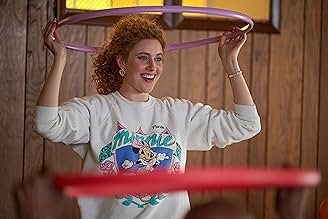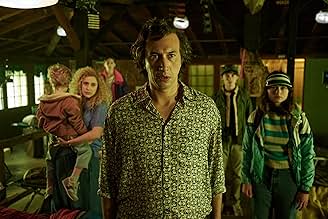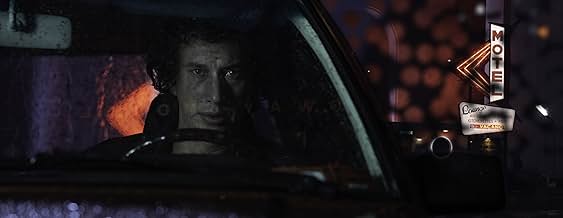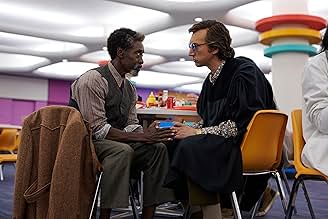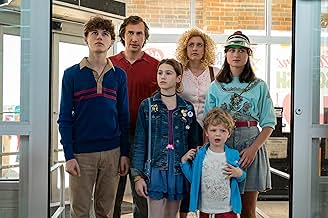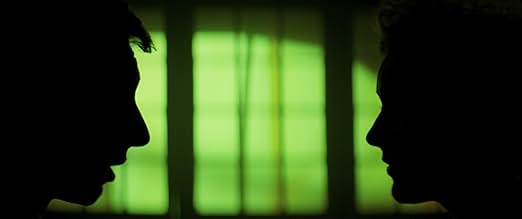Uma família americana nada convencional lida com o amor, a felicidade e a morte em meio a um evento catastrófico.Uma família americana nada convencional lida com o amor, a felicidade e a morte em meio a um evento catastrófico.Uma família americana nada convencional lida com o amor, a felicidade e a morte em meio a um evento catastrófico.
- Prêmios
- 3 vitórias e 25 indicações no total
Wickham Reeve
- College on the Hill
- (as Wickham Bermingham)
Mathew Williams
- College on the Hill
- (as Matthew Williams)
- Direção
- Roteiristas
- Elenco e equipe completos
- Produção, bilheteria e muito mais no IMDbPro
Avaliações em destaque
White Noise is, undoubtedly, the strangest movie Netflix has released this year, which is saying a lot given the competition. The plot is all over the place, the dialogue very stylized, and the overall atmosphere is engaging but off-putting. It's the type of movie that is sure to cause a lot of division in audiences.
At its core, White Noise is about a college professor named Jack and his middle class family dealing with their fear of death, but what actually happens is quite complicated. So complicated, in fact, that it feels like three separate movies smashed together. To be fair, the novel is just as ungainly and incoherent, but at least you had the sense that you were the one with the problem. There was a mystique to DeLillo's writing that made it seem like there was a lot going on thematically with the strange choices. But in the movie? It just seems like bad, pretentious writing. I'm not even sure if Baumbach knew what DeLillo's aim was, or if he just guessed.
One symptom of this is that the unnatural dialogue stick out like a sore thumb: in a scene where Jack's wife, Babette, says how open she is with communicating her feelings, Driver says "That is the point of Babette." In another moment, Jack is shopping with his coworker when said coworker suddenly says that Jack's wife's "hair looks important." What is the point of lines like this? Because all it accomplishes is taking you out of the moment and reminding you that you're watching a movie with a script. Not to mention the multiple long, unintelligible "philosophical" monologues that occasionally pop up. Is it an intentional commentary on the hollowness of academia? If so, then why are they presented so uncritically and played dead straight? It's just another disjointed element of the movie that seems unfinished.
But even if the script fails them, the cast and tech crew don't give up on trying. Driver and Gerwig give very different performances, the former acting almost like an intentional caricature of a sitcom dad, and the latter trying to be serious the whole time. And yet it's one of the few disparate combinations in the film that actually pays off: their acting is convincing as a real couple. Gerwig, in particular, brings emotion to scenes that were completely absent of it on the page. The production design and score are also on point, creating a distinct and interesting atmosphere that also furthers the film's supposed social commentary. But none of this is quite enough to save White Noise from itself and its shortcomings.
The best part of the film is far and away the end credits. I'm not saying that as some sort of flippant joke about the movie's quality, it's a genuinely incredible sequence. Somehow it captures the exact type of weirdness and existentialism and fun that's absent from the rest of the movie. It's so good that, in all honesty, you could probably skip the rest of the movie for it. White Noise is consistently watchable and unique, unlike anything else you'll see this year. But it's aimless, confused, and ultimately baffling to make any significant impact.
Final Score: 62/100.
At its core, White Noise is about a college professor named Jack and his middle class family dealing with their fear of death, but what actually happens is quite complicated. So complicated, in fact, that it feels like three separate movies smashed together. To be fair, the novel is just as ungainly and incoherent, but at least you had the sense that you were the one with the problem. There was a mystique to DeLillo's writing that made it seem like there was a lot going on thematically with the strange choices. But in the movie? It just seems like bad, pretentious writing. I'm not even sure if Baumbach knew what DeLillo's aim was, or if he just guessed.
One symptom of this is that the unnatural dialogue stick out like a sore thumb: in a scene where Jack's wife, Babette, says how open she is with communicating her feelings, Driver says "That is the point of Babette." In another moment, Jack is shopping with his coworker when said coworker suddenly says that Jack's wife's "hair looks important." What is the point of lines like this? Because all it accomplishes is taking you out of the moment and reminding you that you're watching a movie with a script. Not to mention the multiple long, unintelligible "philosophical" monologues that occasionally pop up. Is it an intentional commentary on the hollowness of academia? If so, then why are they presented so uncritically and played dead straight? It's just another disjointed element of the movie that seems unfinished.
But even if the script fails them, the cast and tech crew don't give up on trying. Driver and Gerwig give very different performances, the former acting almost like an intentional caricature of a sitcom dad, and the latter trying to be serious the whole time. And yet it's one of the few disparate combinations in the film that actually pays off: their acting is convincing as a real couple. Gerwig, in particular, brings emotion to scenes that were completely absent of it on the page. The production design and score are also on point, creating a distinct and interesting atmosphere that also furthers the film's supposed social commentary. But none of this is quite enough to save White Noise from itself and its shortcomings.
The best part of the film is far and away the end credits. I'm not saying that as some sort of flippant joke about the movie's quality, it's a genuinely incredible sequence. Somehow it captures the exact type of weirdness and existentialism and fun that's absent from the rest of the movie. It's so good that, in all honesty, you could probably skip the rest of the movie for it. White Noise is consistently watchable and unique, unlike anything else you'll see this year. But it's aimless, confused, and ultimately baffling to make any significant impact.
Final Score: 62/100.
This film has some hilarious one liners and twisted distortions of reality. The first act had me so intrigued I was gripped. Then I was confused. Then I couldn't decide if it was a comedy intentionally or not.
The reality is this film doesn't quite know what it is, and if you think it's going to go somewhere or wrap anything up at the end then you are dead wrong.
Weird for weirds sake is the name of the game. Think of a psychedelic trip by someone who likes the smell of their own farts and decided to write it down.
A future cult classic in the making and I'm sure many people will revere this film for years to come; rewatching it for it's one liners and oddities. For me however one baffling, confusing watch is enough to last a lifetime.
The reality is this film doesn't quite know what it is, and if you think it's going to go somewhere or wrap anything up at the end then you are dead wrong.
Weird for weirds sake is the name of the game. Think of a psychedelic trip by someone who likes the smell of their own farts and decided to write it down.
A future cult classic in the making and I'm sure many people will revere this film for years to come; rewatching it for it's one liners and oddities. For me however one baffling, confusing watch is enough to last a lifetime.
What exactly does this film want to achieve? Why should the weird and sometimes paranoid look or angle of a director or script writer be something worth mentioning, let alone made into a movie? I honestly tried to see this movie with as clear a mind as I can... Is there something wrong with me? Is there some secret dimension hidden in this film that I (40 years old) can't grasp? Where is the director looking forward to? Amuse us? Entertain us? Drive us crazy? The last one, he succeeded! What did I watch? A strange, motley family whose members' dialogues use pretentious expressions full of disjointed, meaningless words and a tendency to impress even the teenagers of the family with their knowledge and strange inclinations! Do us a favor... We are not so easy to get. 1/10 from me.
I have to admire Noah Baumbach for following up Marriage Story with White Noise. Apart from each starring Adam Driver and centring on a family, the two couldn't be more different. One's a deeply emotional, easy to follow, and very moving family drama, and the other one... well, it's White Noise.
It's got a premise that's hard to describe. There's a disaster which causes a great deal of panic for much of the film, but it's not the film's entire focus. In some ways, it feels a little like three short films all starring the same characters, and it's a bit hard to figure out how it all connects sometimes.
The movie reminded me of other wild, unpredictable, all over the place movies in recent years, like Inherent Vice and Under the Silver Lake, but both of those felt like they had more method to their madness, and were consistent with their craziness.
White Noise definitely isn't bad though. Adam Driver is as great as always, there were some funny parts, and much of the first hour or so is quite exciting. I'd say it's the final 45 minutes that have a few parts that drag, but then again, it builds to a good final scene, so make of that what you will.
I look forward to seeing what people say when this drops on Netflix (but who knows whether it'll get much attention - it can be hard to predict what will trend). I have no shame in admitting that maybe some of the discussion will help me understand the parts of this film that I didn't quite get from watching it just now.
(Also, if the Academy Awards don't nominate the LCD Soundsystem song written for this movie for Best Original Song, then they're cowards and/or they have no ears).
It's got a premise that's hard to describe. There's a disaster which causes a great deal of panic for much of the film, but it's not the film's entire focus. In some ways, it feels a little like three short films all starring the same characters, and it's a bit hard to figure out how it all connects sometimes.
The movie reminded me of other wild, unpredictable, all over the place movies in recent years, like Inherent Vice and Under the Silver Lake, but both of those felt like they had more method to their madness, and were consistent with their craziness.
White Noise definitely isn't bad though. Adam Driver is as great as always, there were some funny parts, and much of the first hour or so is quite exciting. I'd say it's the final 45 minutes that have a few parts that drag, but then again, it builds to a good final scene, so make of that what you will.
I look forward to seeing what people say when this drops on Netflix (but who knows whether it'll get much attention - it can be hard to predict what will trend). I have no shame in admitting that maybe some of the discussion will help me understand the parts of this film that I didn't quite get from watching it just now.
(Also, if the Academy Awards don't nominate the LCD Soundsystem song written for this movie for Best Original Song, then they're cowards and/or they have no ears).
It's funny when you encounter a film with so many likeable elements that simply never cohere into something that works. This film reminded me of "I Heart Huckabees" in that sense ... I enjoyed all the parts considered in isolation, but the film itself is decidedly less than the sum of it's parts.
The film is divided into three acts. We're introduced to star professor of Hitler Studies Adam Driver and his wife Greta Gerwig and their children (almost all from different spouses) in the first act, which gestures at parodying academia without really landing much.
In the middle act, a train crash causes the Airborne Toxic Event ... a cloud of poisonous chemicals that descends on town and causes the family to evacuate. This is the most successful part of the film, impressively staging the event like a darkly comedic disaster film.
The final act is ... a lot less clear and probably best not spoiled. It deals with our need to distract ourselves from the terrors of life with medicine and consumerism. It descends into talky meandering and is really only saved by a magnificent musical number over the end credits.
There's really a lot to like. I found it to be intermittently quite funny. The performances are great, especially Don Cheadle as a fellow professor trying to establish a specialization in Elvis Studies. It's a hugely ambitious film with a unique visual style. I only wish I could say I actually liked it.
The film is divided into three acts. We're introduced to star professor of Hitler Studies Adam Driver and his wife Greta Gerwig and their children (almost all from different spouses) in the first act, which gestures at parodying academia without really landing much.
In the middle act, a train crash causes the Airborne Toxic Event ... a cloud of poisonous chemicals that descends on town and causes the family to evacuate. This is the most successful part of the film, impressively staging the event like a darkly comedic disaster film.
The final act is ... a lot less clear and probably best not spoiled. It deals with our need to distract ourselves from the terrors of life with medicine and consumerism. It descends into talky meandering and is really only saved by a magnificent musical number over the end credits.
There's really a lot to like. I found it to be intermittently quite funny. The performances are great, especially Don Cheadle as a fellow professor trying to establish a specialization in Elvis Studies. It's a hugely ambitious film with a unique visual style. I only wish I could say I actually liked it.
Você sabia?
- CuriosidadesThis is Noah Baumbach's first time writing and directing a book-to-screen adaptation, and only his second adaptation after co-writing the screenplay for O Fantástico Sr. Raposo (2009).
- Erros de gravaçãoIn the opening scene, many vehicles featured in Murray's crash sequence reel are from the 1990s and 2000s, whereas White Noise takes place in the 1980s.
- Cenas durante ou pós-créditosThere is a scene at the end where the characters dance in a supermarket. As the credits start to roll, this sequence is played partially in reverse as the music continues to play normally.
- Trilhas sonorasLincoln Portrait
Written by Aaron Copland
Principais escolhas
Faça login para avaliar e ver a lista de recomendações personalizadas
- How long is White Noise?Fornecido pela Alexa
Detalhes
- Data de lançamento
- Países de origem
- Central de atendimento oficial
- Idiomas
- Também conhecido como
- Ruido De Fondo
- Locações de filme
- Wellington, Ohio, EUA(Storefronts are built out and set up for July filming)
- Empresas de produção
- Consulte mais créditos da empresa na IMDbPro
Bilheteria
- Orçamento
- US$ 145.000.000 (estimativa)
- Faturamento bruto mundial
- US$ 71.728
- Tempo de duração2 horas 16 minutos
- Cor
- Proporção
- 2.39 : 1
Contribua para esta página
Sugerir uma alteração ou adicionar conteúdo ausente



